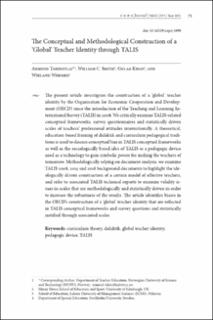| dc.contributor.author | Tahirsylaj, Armend | |
| dc.contributor.author | Smith, William C. | |
| dc.contributor.author | Khan, Gulab | |
| dc.contributor.author | Wermke, Wieland | |
| dc.date.accessioned | 2021-09-30T10:23:35Z | |
| dc.date.available | 2021-09-30T10:23:35Z | |
| dc.date.created | 2021-09-29T10:33:52Z | |
| dc.date.issued | 2021 | |
| dc.identifier.citation | Center for Educational Policy Studies Journal – CEPS Journal. 2021, 11 (3), 75-95. | en_US |
| dc.identifier.issn | 1855-9719 | |
| dc.identifier.uri | https://hdl.handle.net/11250/2786543 | |
| dc.description.abstract | The present article investigates the construction of a ‘global’ teacher identity by the Organisation for Economic Cooperation and Development (OECD) since the introduction of the Teaching and Learning International Survey (TALIS) in 2008. We critically examine TALIS-related conceptual frameworks, survey questionnaires and statistically driven scales of teachers’ professional attitudes internationally. A theoretical, education-based framing of didaktik and curriculum pedagogical traditions is used to discuss conceptual bias in TALIS conceptual frameworks as well as the sociologically based idea of TALIS as a pedagogic device used as a technology to gain symbolic power for making the teachers of tomorrow. Methodologically relying on document analysis, we examine TALIS 2008, 2013 and 2018 background documents to highlight the ideologically driven construction of a certain model of effective teachers, and refer to associated TALIS technical reports to examine validity issues in scales that are methodologically and statistically driven in order to increase the robustness of the results. The article identifies biases in the OECD’s construction of a ‘global’ teacher identity that are reflected in TALIS conceptual frameworks and survey questions and statistically justified through associated scales. | en_US |
| dc.language.iso | eng | en_US |
| dc.publisher | University of Ljubljana, Slovenia | en_US |
| dc.rights | Navngivelse 4.0 Internasjonal | * |
| dc.rights.uri | http://creativecommons.org/licenses/by/4.0/deed.no | * |
| dc.title | The Conceptual and Methodological Construction of a ‘Global’ Teacher Identity through TALIS | en_US |
| dc.type | Peer reviewed | en_US |
| dc.type | Journal article | en_US |
| dc.description.version | publishedVersion | en_US |
| dc.source.pagenumber | 75-95 | en_US |
| dc.source.volume | 11 | en_US |
| dc.source.journal | Center for Educational Policy Studies Journal – CEPS Journal | en_US |
| dc.source.issue | 3 | en_US |
| dc.identifier.doi | https://doi.org/10.26529/cepsj.1090 | |
| dc.identifier.cristin | 1940348 | |
| cristin.ispublished | true | |
| cristin.fulltext | original | |
| cristin.qualitycode | 1 | |

